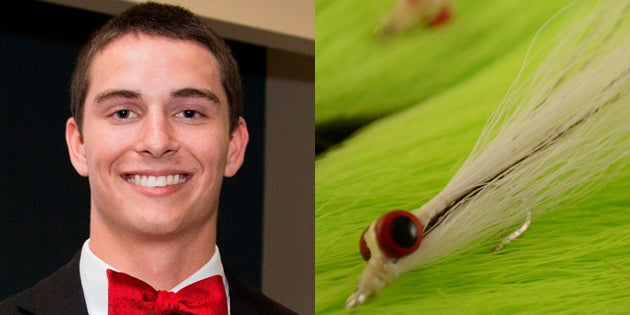Freshman Jesse Horine can hardly wait to take his first business course at the College of Charleston.
Having spent the past year implementing a business plan he developed as a senior at Fort Mill (S.C.) High School, the 18-year-old is looking forward to building on his entrepreneurial knowledge as a business administration major in the School of Business.
Horine’s plan for an online retail store for fly-fishing gear and apparel has already been recognized in local, state and national student entrepreneurship competitions. Just last week he took second place out of 41 competitors at the Network for Teaching Entrepreneurship’s National Challenge in California’s Silicon Valley. He won a $5,000 prize package from MasterCard.
He qualified for the national competition after placing second in the YEScarolina State Business Plan Competition, which was held in the School of Business’ Beatty Center in June 2014. He won $2,000 in seed funding as well as the all-expenses-paid trip to Silicon Valley.
 Horine describes his business venture, SouthernFly, as a “lifestyle brand that sells convenience and a complete experience for outdoor enthusiasts and fly fishermen.” He designs, makes and tests the flies himself.
Horine describes his business venture, SouthernFly, as a “lifestyle brand that sells convenience and a complete experience for outdoor enthusiasts and fly fishermen.” He designs, makes and tests the flies himself.
A company website is in the works, and the brand is gaining followers on Instagram and Twitter at the handle @SouthernFly_SC.
RELATED: See pictures of Jesse Horine’s fly fishing creations on Instagram.

Jesse Horine (center) with College alumni and YEScarolina employees Harriett Lee ’08 (right) and Molly Crete ’14 (left).
Horine got started on his entrepreneurial path at Fort Mill High School, which is one of more than 40 schools in South Carolina that offers an entrepreneurship class based on curriculum developed by the Network for Teaching Entrepreneurship (NFTE). The program is implemented in South Carolina by the non-profit YEScarolina (Youth Entrepreneurship South Carolina), which certifies teachers to conduct the entrepreneurship classes.
Tommy Baker, owner of Baker Motor Co. and a member of the School of Business Board of Governors, is the chair of YEScarolina’s Board of Directors.
Horine’s high school entrepreneurship teacher and mentor Jennifer Molnar immediately recognized the business potential for his creations and encouraged him develop a business plan for the school’s entrepreneurship contest. He won and advanced to the state completion and, ultimately, the national competition.
The preparation for the national competition was intense, Horine says. To polish his presentation and delivery, he worked closely with two College of Charleston alumni: YEScarolina vice president Harriett Lee ’08 and program assistant Molly Crete ’14.
Horine says he scrapped several versions of his presentation and conducted numerous practice runs in front of various groups and business leaders before settling on a pitch worthy of a Silicon Valley stage.
Lee, who majored in international business and was involved with the School of Business entrepreneurship club Enactus, says the education she received at the College helped prepare her to work with the teachers and students in the high school entrepreneurship classes.
“It is so exciting to see future business leaders develop right before your eyes all because of entrepreneurship education at the high school level,” Lee says.
RELATED: Learn more about YEScarolina.
Fly Guy
Horine credits an uncle for getting him interested in fishing and his girlfriend’s father for teaching him about fly fishing.
 “It’s very challenging. That’s why I like it,” he says. “I would like to teach more people how to do it. Longer-term that’s one of my goals is to expand the market.”
“It’s very challenging. That’s why I like it,” he says. “I would like to teach more people how to do it. Longer-term that’s one of my goals is to expand the market.”
As he learned more about fly fishing, Horine realized he had a knack for making, or “tying,” fly fishing lures.
He brought his fly fishing “workshop” with him to college, and his room in Craig Residence Hall is now full of boxes of the raw materials – furs, fibers, hooks and threads – he uses to make his flies. Out of respect for his roommate, he keeps his wares confined to one side of the room.
He finds it relaxing to conceive and design different types of lures for different types of fish and water. “I enjoy watching my flies swim through the water,” Horine says. “It’s a good feeling to see something you have made work like you intended.”
The ultimate test of new flies, however, is whether they perform, he says. “I test all my products. Sometimes I have a perfect fly in my head, but unfortunately it just won’t catch fish.”
Horine encourages budding entrepreneurs to not over-think things and to just jump in, regardless of whether they are still in high school or, like him, just starting college. “Make sure it’s something you’re passionate about,” he advises. “Don’t just do something to try to make a buck off of it.”
Also, he says, don’t wait for the “right” time because it may never come. “There never is a good time to start a business,” he says. “Just go out and do it. Have fun and learn something.”





